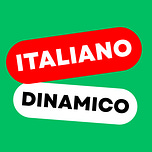Hello there, and welcome back to Italiano Dinamico! 🇮🇹
Last time, we talked about fueling our bodies the Italian way with the Mediterranean Diet. Now, it’s time to put that fuel to good use!
This episode is all about movement, but not the kind you see in the gym. We’re exploring la passeggiata: the essential Italian ritual that combines health benefits, social connection, and effortless stress relief.
As always, this complete lesson package includes the original Italian transcript with the English translation and a dedicated vocabulary list.
Ready to learn how to move, and live,like an Italian? Let’s start! ✨
L’importanza della “passeggiata” e il movimento all’italiana
The importance of the “stroll” and the Italian-style movement
Ciao a tutti e bentornati su Italiano Dinamico! Sono entusiasta di iniziare questo secondo viaggio insieme a voi.
Hello everyone and welcome back to Italiano Dinamico! I’m excited to start this second journey with you.
La scorsa volta abbiamo parlato della Dieta Mediterranea, una filosofia che ci insegna a mangiare con gioia, consapevolezza e convivialità.
Last time we talked about the Mediterranean Diet, a philosophy that teaches us to eat with joy, mindfulness, and conviviality.
Ma per completare il quadro di una vita “all’italiana” sana e appagante, c’è un altro ingrediente fondamentale che non ha calorie, ma dona tantissima energia: il movimento.
But to complete the picture of a healthy and fulfilling “Italian-style” life, there is another fundamental ingredient that has no calories, but gives a lot of energy: movement.
E non sto parlando di sessioni di allenamento estenuanti in palestra, di pesi massacranti o di corse sfiancanti.
And I’m not talking about exhausting training sessions at the gym, crushing weights, or grueling runs.
Parlo di un’arte sottile, lenta, profondamente radicata nella nostra cultura: la passeggiata.
I’m talking about a subtle, slow art, deeply rooted in our culture: the passeggiata (walk).
La passeggiata: non solo camminare, ma un rito sociale
The passeggiata: not just walking, but a social ritual
Quando senti la parola “passeggiata”, cosa ti viene in mente? Probabilmente, una camminata rilassata. Ed è vero, ma in Italia è molto di più. È un vero e proprio rito sociale.
When you hear the word “passeggiata,” what comes to mind? Probably, a relaxed walk. And it’s true, but in Italy it’s much more. It is a true social ritual.
Pensaci: in quasi ogni paese e città italiana, all’ora del tramonto, il corso principale si anima.
Think about it: in almost every Italian town and city, at sunset, the main street comes alive.
Nonni, genitori, bambini, coppie: tutti scendono in strada. Non stanno andando da nessuna parte di preciso; stanno semplicemente “facendo la passeggiata”.
Grandparents, parents, children, couples: everyone goes down to the street. They are not going anywhere in particular; they are simply “doing the passeggiata.”
È il momento per digerire il pasto, per chiacchierare senza fretta, per vedere ed essere visti.
It is the moment to digest the meal, to chat without rushing, to see and be seen.
È un’occasione per staccare la spina dal lavoro e riattaccarla alla comunità. Il corpo si muove, ma è la mente che riposa, immersa in un flusso sociale leggero e confortevole.
It is an opportunity to unplug from work and reconnect with the community. The body moves, but it is the mind that rests, immersed in a light and comfortable social flow.
È un investimento nel benessere, fatto camminando lentamente.
It is an investment in well-being, made by walking slowly.
I benefici: un movimento “a bassa intensità, ad alto impatto”
The benefits: a “low-intensity, high-impact” movement
La scienza, ovviamente, dà ragione alla nonna italiana. Il segreto di questo tipo di movimento sta nella sua costanza e nella sua moderazione.
Science, of course, agrees with the Italian grandmother. The secret of this type of movement lies in its constancy and its moderation.
Non devi correre un’ora al giorno per far bene al cuore. Basta camminare.
You don’t have to run an hour a day to do good for your heart. Just walk.
Una passeggiata regolare, anche di soli 20-30 minuti al giorno, ha benefici straordinari:
A regular walk, even for just 20-30 minutes a day, has extraordinary benefits:
Cuore più forte: L’attività aerobica leggera mantiene il battito cardiaco elevato quel tanto che basta per rafforzare il sistema cardiovascolare, riducendo la pressione e il colesterolo cattivo.
Stronger heart: Light aerobic activity keeps the heart rate elevated just enough to strengthen the cardiovascular system, reducing blood pressure and bad cholesterol.
Migliore digestione: Un piccolo movimento dopo i pasti aiuta il corpo a processare il cibo, riducendo gonfiore e pesantezza. È un’abitudine che i paesi del Nord Europa invidiano.
Better digestion: A little movement after meals helps the body process food, reducing bloating and heaviness. It is a habit that Northern European countries envy.Meno stress: E qui viene il bello. La passeggiata è un atto di mindfulness involontario. Mentre cammini e osservi il mondo attorno a te, il tuo cervello smette di “rimuginare”. È un anti-stress naturale, un’ancora nel caos della vita moderna.
Less stress: And here’s the best part. The walk is an involuntary act of mindfulness. As you walk and observe the world around you, your brain stops “brooding.” It is a natural anti-stress, an anchor in the chaos of modern life.
In fondo, il corpo umano è stato progettato per muoversi con costanza, non per stare seduto ore e poi correre un’ora per “compensare”.
After all, the human body was designed to move constantly, not to sit for hours and then run for an hour to “compensate.”
Il movimento all’italiana: funzionalità prima dell’estetica
Italian-style movement: functionality before aesthetics
Quindi, qual è la lezione da portare a casa? Il movimento all’italiana non è ossessionato dall’estetica, ma dalla funzionalità.
So, what is the lesson to take home? Italian-style movement is not obsessed with aesthetics, but with functionality.
Non ci si muove per i muscoli definiti, ma per il piacere di stare bene e per essere in grado di fare le cose della vita quotidiana: salire le scale, portare le borse della spesa, giocare con i nipoti.
We do not move for defined muscles, but for the pleasure of feeling well and being able to do the things of everyday life: climbing stairs, carrying grocery bags, playing with grandchildren.
Non hai bisogno di un abbonamento costoso in palestra per muoverti di più. Hai solo bisogno di cambiare prospettiva:
You don’t need an expensive gym membership to move more. You just need to change your perspective:
Se devi fare una breve commissione, cammina invece di prendere l’auto.
If you have a short errand to run, walk instead of taking the car.
Prendi le scale invece dell’ascensore.
Take the stairs instead of the elevator.
Dopo cena, anche se fa freddo, fai due passi per digerire meglio e goditi l’aria fresca.
After dinner, even if it’s cold, take a short walk to digest better and enjoy the fresh air.
Adotta il ritmo lento e consapevole della passeggiata, e vedrai che il tuo corpo e la tua mente ti ringrazieranno, proprio come dopo un buon piatto di pasta e fagioli!
Adopt the slow, mindful rhythm of the walk, and you will see that your body and mind will thank you, just like after a good plate of pasta and beans!
Vi sfido a integrare una piccola passeggiata nella vostra routine quotidiana. Trovate il vostro “corso principale” personale e fatene il vostro rito. È un piccolo cambiamento con un impatto enorme sulla vostra qualità di vita.
I challenge you to integrate a small walk into your daily routine. Find your personal “main street” and make it your ritual. It is a small change with a huge impact on your quality of life.
Noi ci sentiamo nel prossimo episodio, dove affronteremo il tema... del digiuno intermittente!
We will hear each other in the next episode, where we will address the topic... of intermittent fasting!
Grazie per aver camminato con me. Alla prossima!
Thank you for walking with me. Until next time!
Key Vocabulary from the Podcast
Passeggiata
Translation: Stroll / Walk
Explanation: While literally “a walk,” in this context, it refers to the culturally significant Italian ritual of taking a relaxed walk, usually in the evening, as a social and community activity, not just for exercise.
Rito sociale
Translation: Social ritual
Explanation: An established set of actions or behaviors (like the passeggiata) performed regularly by a community for social or cultural purposes, emphasizing its importance beyond simple functionality.
Convivialità
Translation: Conviviality / Sociability
Explanation: The quality of being friendly and lively; a shared sense of community and good cheer, often associated with shared meals and social gatherings. It’s a key theme in Italian lifestyle.
Estenuanti
Translation: Grueling / Exhausting
Explanation: Used to describe something that is extremely tiring or demanding (e.g., sessioni estenuanti - exhausting sessions). The text contrasts this with the moderate nature of the passeggiata.
Sfiancanti
Translation: Tiring / Fatiguing
Explanation: Similar to estenuanti, but often implies being worn out or drained of energy. Used here to refer to overly demanding physical activity.
Mindfulness
Translation: Mindfulness
Explanation: Although an English word used in the Italian text, it refers to the psychological process of intentionally bringing one’s attention to the present moment without judgment. The passeggiata is described as an act of involuntary mindfulness.
Rimuginare
Translation: To ruminate / To mull over
Explanation: To constantly think deeply about the same things, often worries or problems, without finding a solution. The text suggests the passeggiata helps the brain stop this process.
Ossessionato/a
Translation: Obsessed
Explanation: Having a persistent preoccupation with something. The text notes that the Italian approach to movement is not obsessed with aesthetics (appearance), but with functionality.
Funzionalità
Translation: Functionality
Explanation: The quality of being suited to serve a purpose. In the context of movement, it means being able to perform everyday physical tasks comfortably, rather than focusing purely on muscle definition.
Ancora
Translation: Anchor
Explanation: Figuratively, it refers to something that provides stability or security in a difficult situation. The passeggiata is described as an anti-stress anchor in modern life.









